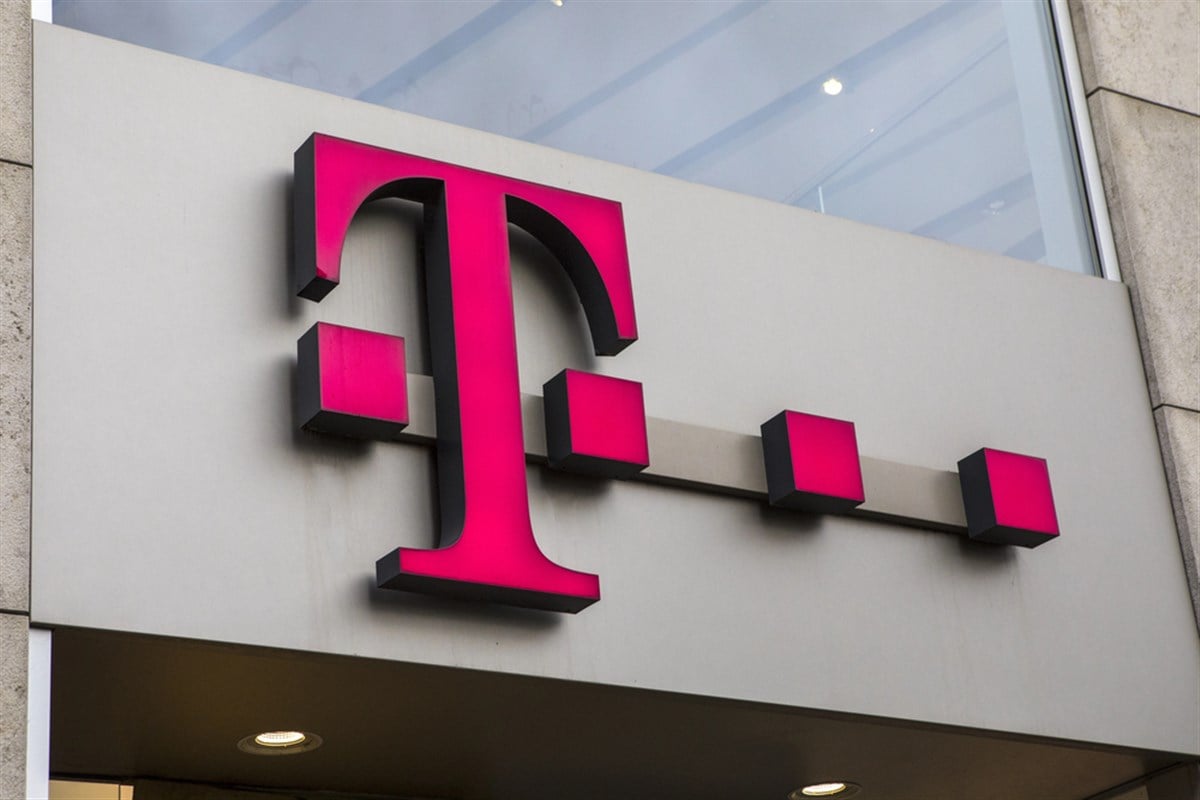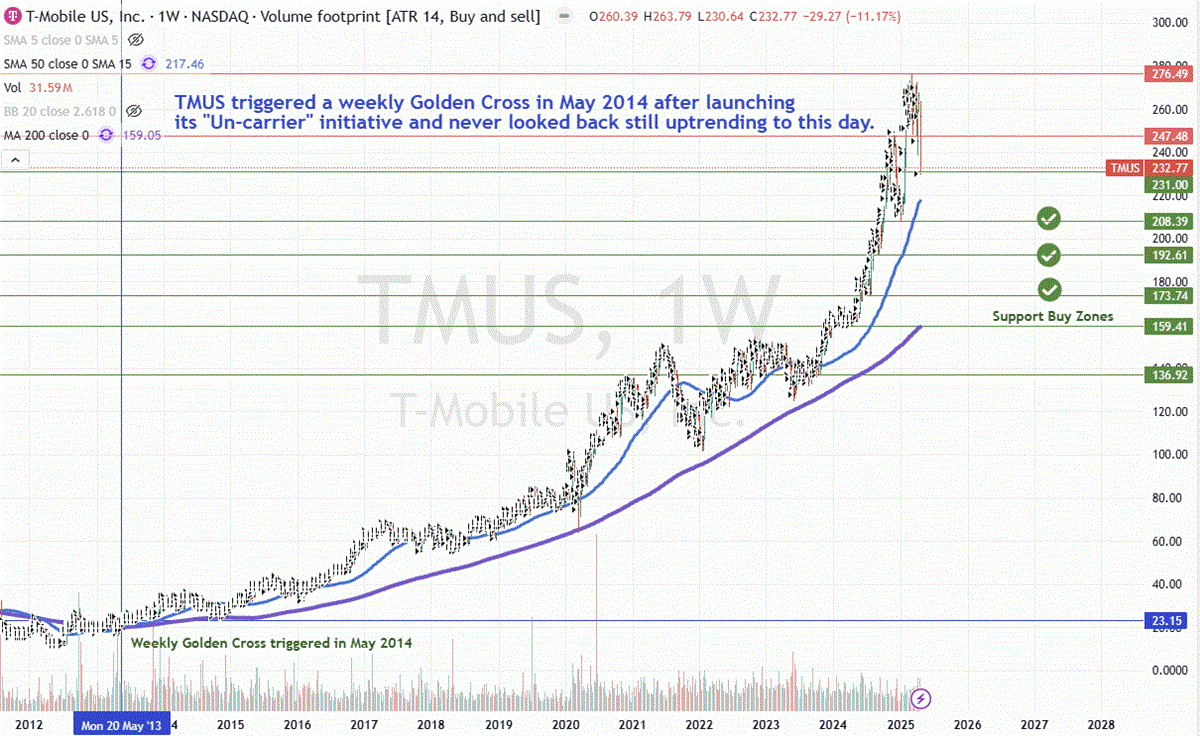|
|
|

|
|||||

|
|

As a disruptor in the computer and technology sector, specifically the telecommunications industry, T-Mobile US (NASDAQ: TMUS) proudly calls itself the "Un-carrier." This originated in March 2013, when they set out to differentiate themselves against the incumbent telecom “carriers” AT&T Inc. (NYSE: T) and Verizon Communications Inc. (NYSE: VZ).
T-Mobile pioneered many of the policies consumers now take for granted in the wireless industry. Its brilliant marketing efforts and significant operational changes have propelled the stock's long-term upward trend for more than 11 years since 2014.
Despite climbing from $23.15 to an all-time high of $276.49, the company continues to demonstrate exceptional growth, making it a strong candidate for a buy-the-dip strategy during market pullbacks.
The term “Un-carrier” is designed to mean the opposite of a traditional telecom "carrier," representing the old way of doing business, like locking cellphone customers into long-term contracts with termination fees, hidden fees and terrible customer service.
T-Mobile took the exact opposite approach, offering no contracts, no termination fees, transparency and exceptional customer service. When they switched over, they even offered to buy out customers from their contracts with AT&T and Verizon.
T-Mobile is also known for pioneering “unlimited data plans” as well as bundling in perks like complimentary Netflix Inc. (NASDAQ: NFLX) subscriptions, and offering free international roaming. Millennials and Gen-Z smartphone users may find it hard to believe, but customers used to be charged by the minute when using their cell phones to make and receive calls.

Very few companies force changes onto, aka disrupt, an industry stuck in its own ways. T-Mobile’s policy changes were so popular that the incumbent carrier giants were forced to adopt the same policies to sustain their market share. The success and popularity of T-Mobile’s “Un-carrier” initiatives placed significant pressure on AT&T and Verizon to eliminate long-term contract termination fees, adopt more transparent pricing, and offer their version of installment plans, unlimited data plans and bundle perks to remain competitive.
This powered the meteoric rise of its stock for the next 12 years.
Investors ask this question with each earnings report: Is the meteoric ride over? Has growth peaked out? In its fiscal first quarter of 2025, T-Mobile reported solid earnings per share (EPS) of $2.58, beating analyst expectations by 11 cents. This was its best-ever Q1, with 29% YOY EPS growth.
Revenues climbed 6.6% year-over-year (YOY) to $20.89 billion, beating consensus estimates of $20.63 billion. Adjusted free cash flow grew 31% YOY to $.4 billion, the best Q1. Core adjusted earnings before interest, taxes, depreciation, and amortization (EBITDA) grew 8% YOY to $8.3 billion, the best Q1 ever.
In comparison, AT&T reported EPS of 51 cents, missing consensus estimates by 2 cents, as revenues rose 2% YOY to $30.6 billion versus $30.42 billion. Verizon reported Q1 2025 EPS of $1.19, beating consensus estimates by 4 cents as revenues rose 1.5% YOY to 33.5 billion versus $33.28 billion.
T-Mobile added 1.3 million new customers, leading the industry and delivering its best-ever first quarter. High-speed internet net additions grew by 424,000, also leading the industry and setting a new record for the company.
From the data, T-Mobile is still growing and outpacing AT&T and Verizon combined in many metrics.
T-Mobile CEO Mike Sievert commented, “A record number of customers chose the Un-carrier in Q1—we grew postpaid gross additions year-over-year across the board. Our High-Speed Internet business led the industry in net customer additions for the 13th straight quarter. And all of this customer growth drove fantastic financial growth with strong net cash provided by operating activities and our highest-ever Q1 Adjusted Free Cash Flow.”
T-Mobile collaborated with SpaceX to use their Starlink satellites to provide direct-to-cell (DTC) connectivity, much like AST SpaceMobile Inc. (NASDAQ: ASTS). This expands T-Mobile's coverage network to help eliminate dropped calls in network dead zones, providing universal connectivity. The project is in beta launch under T-Satellite, the only satellite network in the US working on most modern smartphones, connecting from terrestrial to satellite networks.
Currently, the service works with text messaging, with plans to expand to voice and data. ASTS has already established video calls from its satellite network and has deals in place with AT&T and Verizon, as well as over 45 mobile network operators (MNOs).
Before you make your next trade, you'll want to hear this.
MarketBeat keeps track of Wall Street's top-rated and best performing research analysts and the stocks they recommend to their clients on a daily basis.
Our team has identified the five stocks that top analysts are quietly whispering to their clients to buy now before the broader market catches on... and none of the big name stocks were on the list.
They believe these five stocks are the five best companies for investors to buy now...
The article "T-Mobile US: The Un-Carrier Is an Indisputable Buy on the Dip " first appeared on MarketBeat.
| 4 min | |
| 20 min | |
| 1 hour |
Stock Market Today: Dow Skids As EU Makes Trump Tariff Move; These Gold Stocks Shine (Live Coverage)
VZ
Investor's Business Daily
|
| 1 hour | |
| 1 hour | |
| 1 hour | |
| 1 hour | |
| 2 hours | |
| 2 hours | |
| 2 hours | |
| 2 hours | |
| 2 hours |
Stock Market Today: Dow Dives As EU Makes Trump Tariff Move; Novo Plunges On This (Live Coverage)
VZ
Investor's Business Daily
|
| 3 hours | |
| 3 hours | |
| 4 hours |
Join thousands of traders who make more informed decisions with our premium features. Real-time quotes, advanced visualizations, backtesting, and much more.
Learn more about FINVIZ*Elite